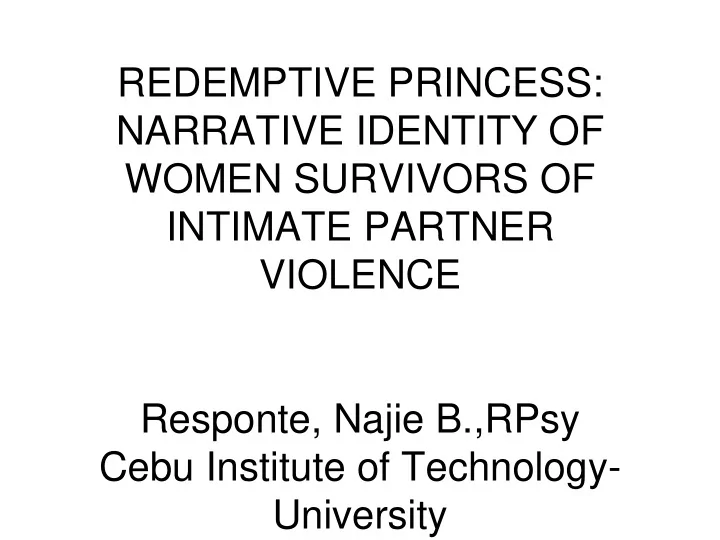

REDEMPTIVE PRINCESS: NARRATIVE IDENTITY OF WOMEN SURVIVORS OF INTIMATE PARTNER VIOLENCE Responte, Najie B.,RPsy Cebu Institute of Technology- University
People always desire a fairy tale with a happy ending. They stand before the altar and vow to love each other forever, till death do they part. But what if one day, the dream of a perfect relationship turns out to be a nightmare? What if the princess wakes up to see the prince turning back to his original form, the beast? This study explored on the narratives of women - who once upon a time dreamt of having a happy ending, but, as her story unfolds, the prince charming was not kind after all. Also, this study gets into a deeper look on how their identity was affected or changed because of their abusive situation.
THEORIES • The cycle of abuse, Walker (1979) identified the five phases of the abuse cycle: (a) Build- up phase, (b) stand-over phase, (c) remorse phase, (d) pursuit phase, and (e) honeymoon phase. • The reason for staying, women remain in threatening situations because of power disparities, fear, lack of support, and because there is nowhere else to go if shelters are unknown (Hoff, 1990). • The effects of abused, women involved in a violent relationship reported receiving physical injuries as a result of the abuse, which can lead to disability that prevents work and causes chronic pain
• Psychological and sociological frameworks are often used here in the Philippines (Ofreneo, 2007). The psychological discourse, this framework looks into the psychological aspect on why violence was committed and the psychological effects of violence. This framework looks into social practices and structural relations on why abuse happens.
The effects of abuse on narrative identity. Scott (1992) suggests that identities are constituted through experiences. IPV survivors and those who are in the process of leaving the abusive relationship have experienced shakes in their view of the world and their identity. Connelly and Clandinin (1999) posits that through composing and improvising what people go through with their lives, identities were formed. narrative theory states that people interpret their identities and their world according to developed stories (Freedman & Combs, 1996).
Narrative as another Framework in Understanding IPV • Narrative is one way of learning about the inner world through verbal accounts and stories presented by individual narrators about their lives and their experienced reality (Lieblich, Tuval-Mashiach, & Zilber, 1998). • Narratives show an organized interpretation of a sequence of events (Murray, 2008). This internalized, evolving, and integration of the self in a story is called narrative identity (McAdams, 2008)
RESEARCH DESIGN The research was an exploratory and qualitative study on the experiences of some Filipino women survivors’ of intimate partner violence. A collection of in-depth stories was done and narrative framework and analysis was utilized. Data Analysis The first step in doing narrative work was to transcribe the interview in verbatim. The second step was the reconstructing of the interview into a narrative text. Third, the researcher identified the beginning, middle, turning points, and ending through the narrative text. Fourth, the researcher and other external raters analyzed the data in terms of form, direction, themes and unique outcome.
RESULTS and DISCUSSION
The 10 Stages of Breaking Free from Intimate Partner Violence • Based from the beginning, middle, turning points, and ending of nine narratives of survivors of IPV, their love story, their struggle of abuse, and how they freed themselves from the cycle of abuse can be summarized under 10 stages. T he researcher will call this as the 10 stages of breaking free from intimate partner violence.
The Redemptive Princess: Narrative Identity of IPV Women Survivors • After leaving the abusive relationships and moving on with their new lives, new identities were formed. According to McAdams (2006), redemption is when the protagonist in the study, the survivors, repeatedly encounters negative events that are transformed into redemption sequences providing hope and confidence for the future. As the protagonist looks ahead in life, he or she sets forths prosocial goals aimed at improving the lives of others and leaving a positive legacy of the self. From being the abused, these women realized what they deserve and that is part of the new identity that they have created.
IMPLICATIONS and FUTURE RESEARCH • Theory • Research • Practice and Interventions • Justice Sytem/enforcement • Future Clinicians • Affected Families • Perpetrators
Abuse might be very devastating, but soon it will be a story to tell. Like the women in this study, you might look back, one day, and may get to read those chapters as merely parts of your beautiful history. Your fairytale might not have the happy ending you have always thought, but, you can have a not-so-typical story about a princess redeeming the life she deserves. After all, it’s not about the ending but the story itself. Until then, you can write an end note borrowing from Nietzche, saying, “What doesn’t kill you will only make you stronger.” It is not promoting violence or the thought that one’s suffering is nothing. It is what that can’t kill them makes them stronger
Recommend
More recommend